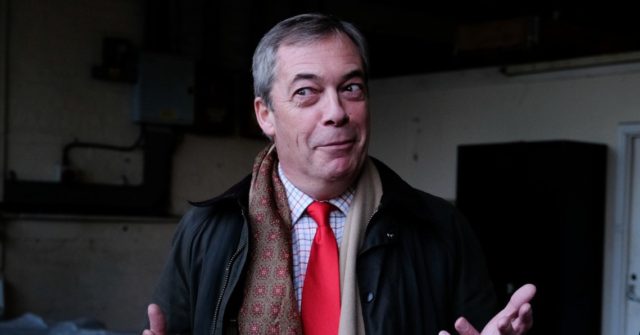
Brexit Party leader Nigel Farage was attacked both by elements within his own party and by Conservatives during the general election campaign when he declared a “unilateral leave alliance”, but his gamble has paid off as the hard-left Labour party were crushed at the polls.
While the Brexit Party had originally intended to contest nearly every seat nationwide, a last-minute gamble by party leader Nigel Farage to stand down candidates who would have been opposing sitting Conservative Members of Parliament appears to have been a crucial moment int he campaign.
Mr Farage was bitterly criticised within his own party for the move, particularly by the candidates and campaigners in seats being stood down, with some even going so far as to accuse the Brexit campaigner of a betrayal.
Mr Farage was also the target of pressure from the Conservatives, disappointed he hadn’t stood down all candidates nationwide — although they themselves refused to stand aside in seats where the Brexit Party may have had a better chance of toppling Labour that them.
Listen: Breitbart London editor Oliver Lane discusses the election result and Nigel Farage’s influence in the vote with Alex Marlowe on Breitbart News Daily
The critics asserted that Mr Farage had torpedoed his own party to achieve nothing — and expressed fears up until the very last day of campaigning that the decision to stand candidates in 276 seats around the country would split the pro-Brexit vote, depriving the Tories of a majority and handing the keys of No. 10 to Jeremy Corbyn.
Yet Jeremy Corbyn’s increasingly hard-left Labour party suffered a historic defeat Thursday, with results running in over the early hours of Friday morning confirming the party experienced its worst electoral performance since 1935.
In part, this was down to Farage’s gamble on not standing against the Conservatives. This is the first election in a decade where the Conservatives have been able to stand in held seats without being opposed by either UKIP or the Brexit Party — freeing up activists to campaign elsewhere.
Also apparent was the impact of the Brexit Party not on the Conservative vote in marginal seats, but on Labour instead. Top Corbynite John McDonnell noted the trend as the results came in overnight.
He told Sky News: “If you look at what’s happened in most of the seats — particularly in the Northern seats — the votes showed shifts have been from Labour to the Brexit Party rather than the Tories.
“We just couldn’t get through the Brexit argument, basically.”
Farage had repeatedly assured critics that in many seats the Brexit Party would take more votes from Labour than from the Conservatives, making Prime Minister Johnson’s party more likely to take them.
Swinson: Farage Has Made It Much Harder for Lib Dems to Take Tory Seats https://t.co/O4h3RtT9D4
— Breitbart London (@BreitbartLondon) December 9, 2019
None of this is to minimise the obvious importance of the Conservatives themselves in this campaign — the contrast between the 2017 and 2019 election campaigns has remarkable.
In the former, Theresa May, a Remainer turned lukest-of-luke-warm Brexiteer, had been selected as party leader almost by mistake after Boris Johnson pulled out of the competition over a personal feud with Michael Gove — now a member of his Cabinet.
Clearly unable to appear sincere enough over Brexit to animate the electorate, May killed predecessor David Cameron’s already small majority in a spectacularly calamitous election.
Boris Johnson, on the other hand, has radiated enthusiasm and energy since day one: not a guarantee of good leadership, but a quality that has clearly resonated with the voters.
His campaign has also been sharp-edged and keenly fought — the social media effort in particular, featuring post-ironic memes orientated at millennial voters, grabbed headlines for its often unexpected and surprising nature.
Follow Breitbart London on Facebook: Breitbart London
via Breitbart News
Enjoy this article? Read the full version at the authors website: https://www.breitbart.com
